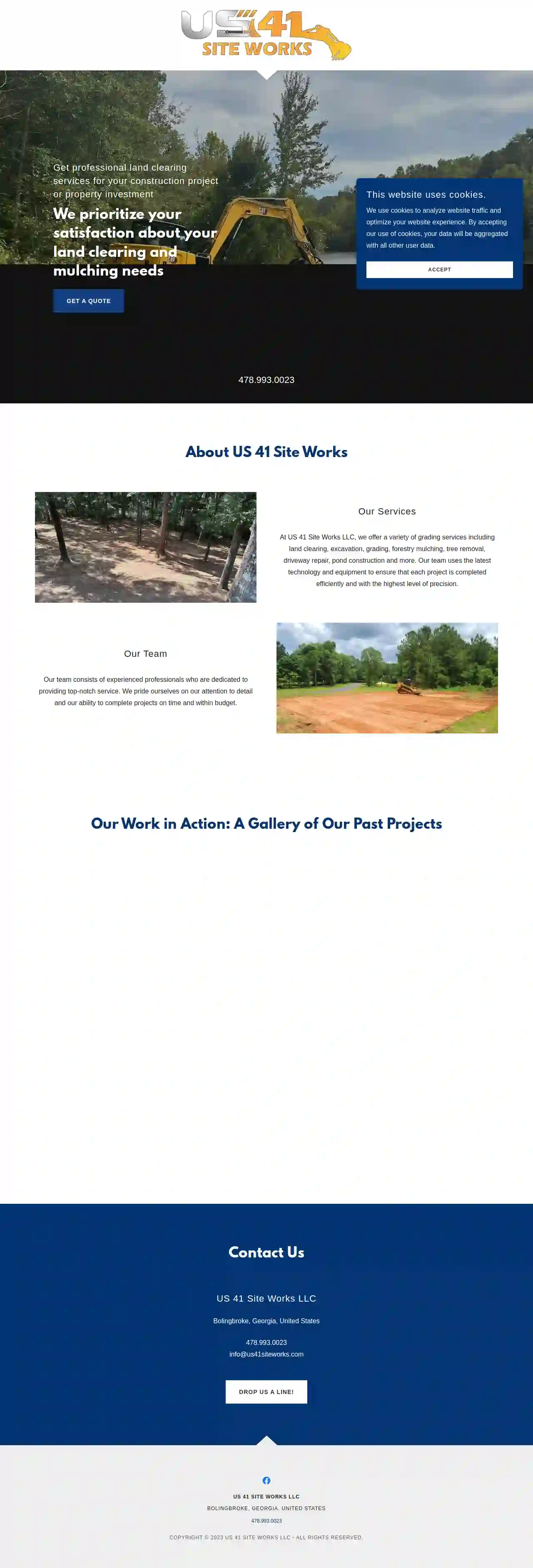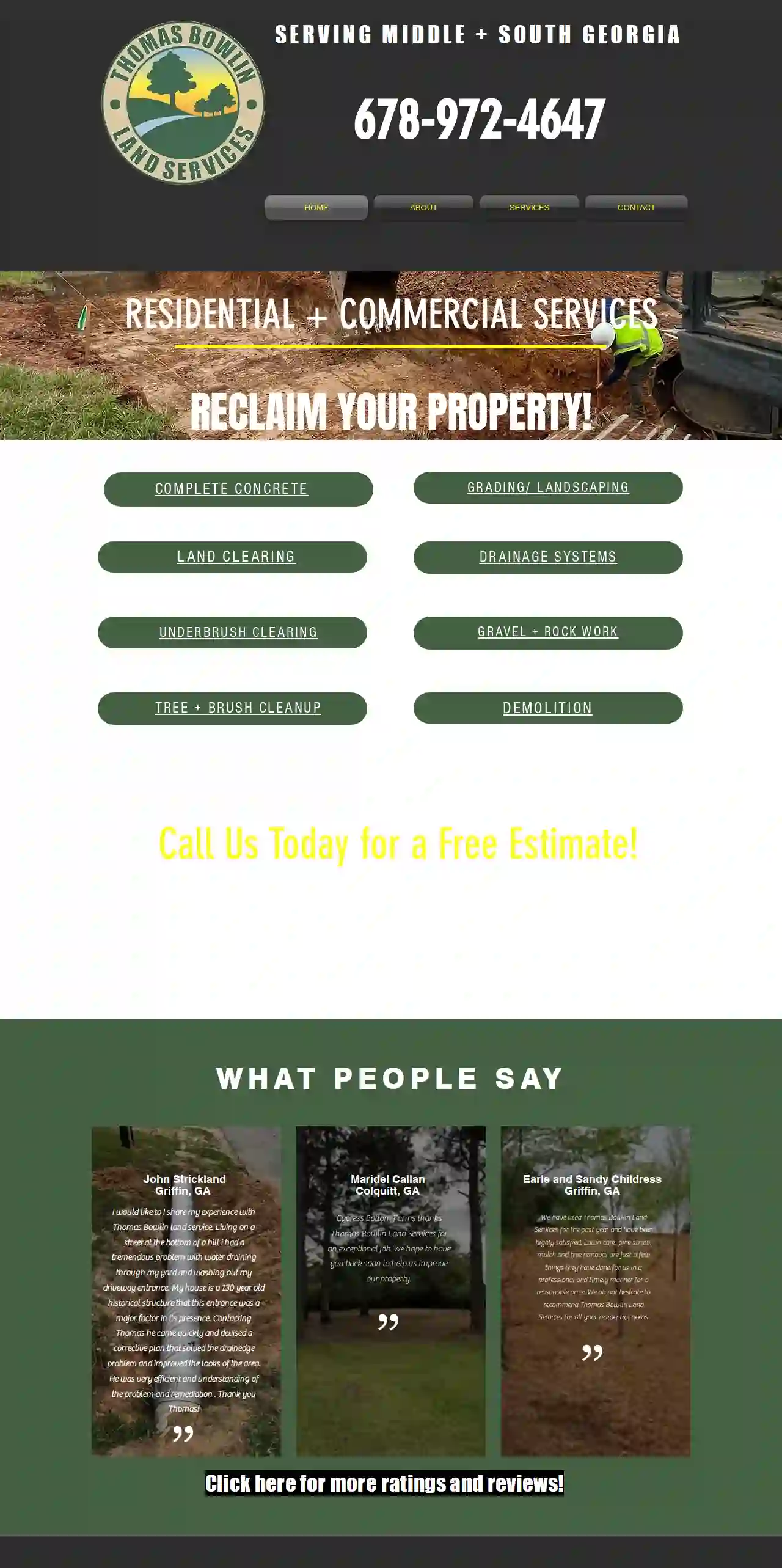Excavation Contractors Macon
Best Excavation Company Near Me in Macon
Get 3 FREE Land Excavation quotes for your project today! Compare profiles, reviews, accreditations, portfolio, etc... and choose the best deal.

Marsh Clearing and Excavation
53 reviewsButler, 31006, USMatthew Marsh- Owner/Operator A Local Expert Committed to Excellence Matthew and his wife, Maddie, have been married for 8 years. They have a 6-year-old son named Jaxton (he's a great helper by the way!). As a loving husband and father, Matthew takes great pride in what he does. Matthew brings ample experience to you with Marsh Clearing and Excavation! He has over 19 years of experience in land clearing, grading, waterline systems, storm drain lines, pond and lake installation (including extensive water services), copper line services, equipment operation, loading and transporting dirt and rock, erosion control, digging hazard materials, as well as many years in industrial mechanic operations. With a well-rounded history in business, we assure you that you've chosen the right company for the job.
- Services
- Why Us?
- Our Team
- Testimonials
- Gallery
Get Quote- Mc
McDuffie Properties
4.65 reviewsMacon, US- Services
- Why Us?
Get Quote - B
B & H Enterprises
3.52 reviewsMacon, US- Services
- Why Us?
Get Quote 
US 41 Site Works LLC
58 reviewsMacon, US- Services
- Why Us?
Get Quote
Thomas Bowlin Land Services
4.58 reviewsMacon, USReclaim Your Property! Thomas Bowlin Land Services is a trusted and reliable company serving Middle and South Georgia. We specialize in a wide range of residential and commercial services, including: Complete Concrete Grading/Landscaping Land Clearing Drainage Systems Underbrush Clearing Gravel + Rock Work Tree + Brush Cleanup Demolition Our team is dedicated to providing high-quality workmanship and exceptional customer service. We are committed to exceeding your expectations and delivering results that you can be proud of. Contact us today for a free estimate!
- Services
- Why Us?
- Testimonials
- Gallery
Get Quote- Da
Davis Excavating & Grading
41 reviewsMacon, US- Services
- Why Us?
Get Quote - Yo
Yoder's Grading
1Macon, US- Services
- Why Us?
Get Quote - Bi
Biles Grading
4.520 reviewsMacon, US- Services
- Why Us?
Get Quote - H&
H&B Site Services
1Macon, US- Services
- Why Us?
Get Quote - D
D F Evans Excavating and Grading
1Macon, US- Services
- Why Us?
Get Quote
Over 21,512+ Excavation Companies registered
Our excavation contractors operate in Macon and beyond!
ExcavationHQ has curated and vetted the Best Excavation Contractors near Macon. Find a trustworthy pro today.
Frequently Asked Questions About Excavation Contractors
- Trench Collapses: Unstable trench walls can cave in, posing a severe risk to workers. Proper shoring and sloping are crucial safety measures.
- Utility Damage: Striking underground utilities (gas, water, electric) can cause leaks, explosions, or electrocution. Accurate utility locates and careful digging are essential.
- Falling Objects: Materials or equipment falling into excavations can injure workers. Securing work areas and using appropriate safety gear is vital.
- Equipment Accidents: Operating heavy machinery involves risks of rollovers, collisions, or mechanical failures. Trained operators and proper equipment maintenance are critical.
- Environmental Hazards: Excavated soil might contain hazardous materials (asbestos, lead). Proper testing and disposal procedures are necessary.
- Basement Size: The larger the basement, the more excavation is required, increasing the cost.
- Soil Type: Excavating rocky or dense clay soil is generally more expensive than loose soil.
- Accessibility: Difficult-to-access sites might require specialized equipment or more labor, driving up costs.
- Foundation Type: The chosen foundation type (full basement, crawl space, slab) affects excavation needs.
- Underpinning: If underpinning (strengthening existing foundations) is necessary, it significantly increases costs.
- Disposal Fees: Hauling excavated soil to disposal sites adds to the overall expense.
- Project Size and Scope: The larger and more complex the excavation, the higher the cost.
- Soil Type: Different soil types require different equipment and techniques, impacting costs. Rocky or clay-rich soil can be more expensive to excavate than loose soil.
- Accessibility: Difficult-to-access sites might require specialized equipment or additional labor, increasing expenses.
- Disposal Costs: Hauling away excavated material (soil, rocks, etc.) to disposal sites incurs additional fees.
- Permits and Inspections: Depending on local regulations, permits and inspections might be required, adding to the overall cost.
- Mechanical Excavation: Utilizing heavy equipment like excavators, backhoes, bulldozers, and loaders, suitable for most projects.
- Hand Excavation: Using hand tools (shovels, picks) for smaller excavations or delicate work near utilities.
- Blasting: Employing explosives to break up rock or hard materials, typically for large-scale projects.
- Hydro Excavation: Using high-pressure water jets to loosen and remove soil, often used for locating utilities or delicate excavation.
- Vacuum Excavation: Employing a vacuum system to suck up excavated material, suitable for safe excavation near utilities or in confined spaces.
What are the risks associated with excavation?
How much does it cost to excavate a basement?
How much does excavation cost?
What are the different methods of excavation?
What are the risks associated with excavation?
- Trench Collapses: Unstable trench walls can cave in, posing a severe risk to workers. Proper shoring and sloping are crucial safety measures.
- Utility Damage: Striking underground utilities (gas, water, electric) can cause leaks, explosions, or electrocution. Accurate utility locates and careful digging are essential.
- Falling Objects: Materials or equipment falling into excavations can injure workers. Securing work areas and using appropriate safety gear is vital.
- Equipment Accidents: Operating heavy machinery involves risks of rollovers, collisions, or mechanical failures. Trained operators and proper equipment maintenance are critical.
- Environmental Hazards: Excavated soil might contain hazardous materials (asbestos, lead). Proper testing and disposal procedures are necessary.
How much does it cost to excavate a basement?
- Basement Size: The larger the basement, the more excavation is required, increasing the cost.
- Soil Type: Excavating rocky or dense clay soil is generally more expensive than loose soil.
- Accessibility: Difficult-to-access sites might require specialized equipment or more labor, driving up costs.
- Foundation Type: The chosen foundation type (full basement, crawl space, slab) affects excavation needs.
- Underpinning: If underpinning (strengthening existing foundations) is necessary, it significantly increases costs.
- Disposal Fees: Hauling excavated soil to disposal sites adds to the overall expense.
How much does excavation cost?
- Project Size and Scope: The larger and more complex the excavation, the higher the cost.
- Soil Type: Different soil types require different equipment and techniques, impacting costs. Rocky or clay-rich soil can be more expensive to excavate than loose soil.
- Accessibility: Difficult-to-access sites might require specialized equipment or additional labor, increasing expenses.
- Disposal Costs: Hauling away excavated material (soil, rocks, etc.) to disposal sites incurs additional fees.
- Permits and Inspections: Depending on local regulations, permits and inspections might be required, adding to the overall cost.
What are the different methods of excavation?
- Mechanical Excavation: Utilizing heavy equipment like excavators, backhoes, bulldozers, and loaders, suitable for most projects.
- Hand Excavation: Using hand tools (shovels, picks) for smaller excavations or delicate work near utilities.
- Blasting: Employing explosives to break up rock or hard materials, typically for large-scale projects.
- Hydro Excavation: Using high-pressure water jets to loosen and remove soil, often used for locating utilities or delicate excavation.
- Vacuum Excavation: Employing a vacuum system to suck up excavated material, suitable for safe excavation near utilities or in confined spaces.